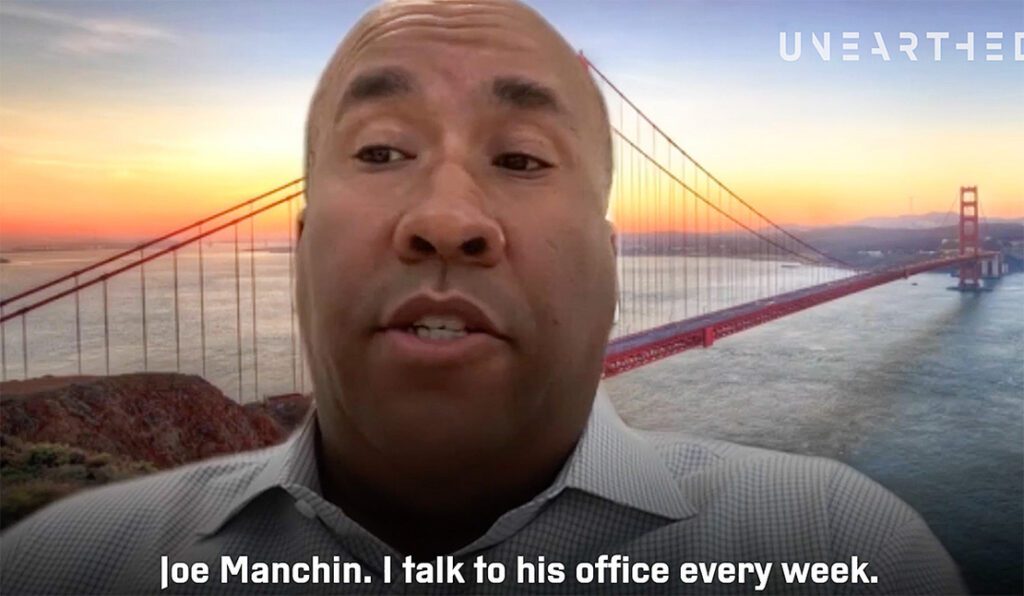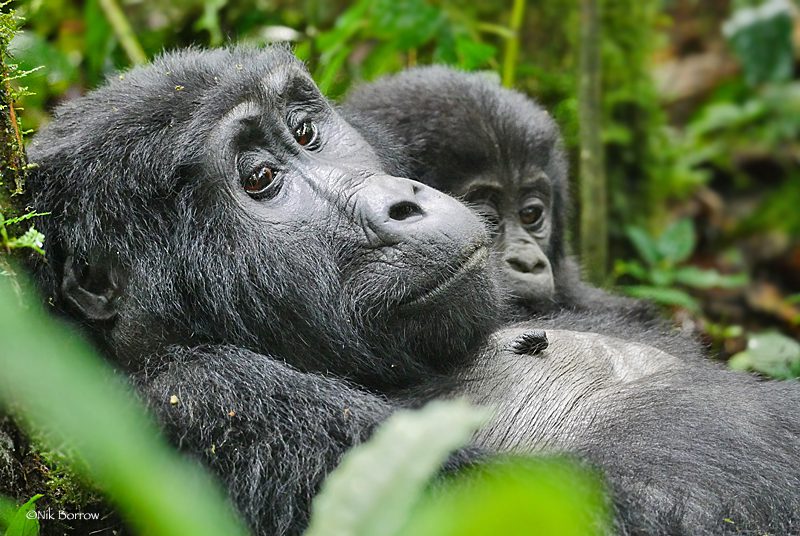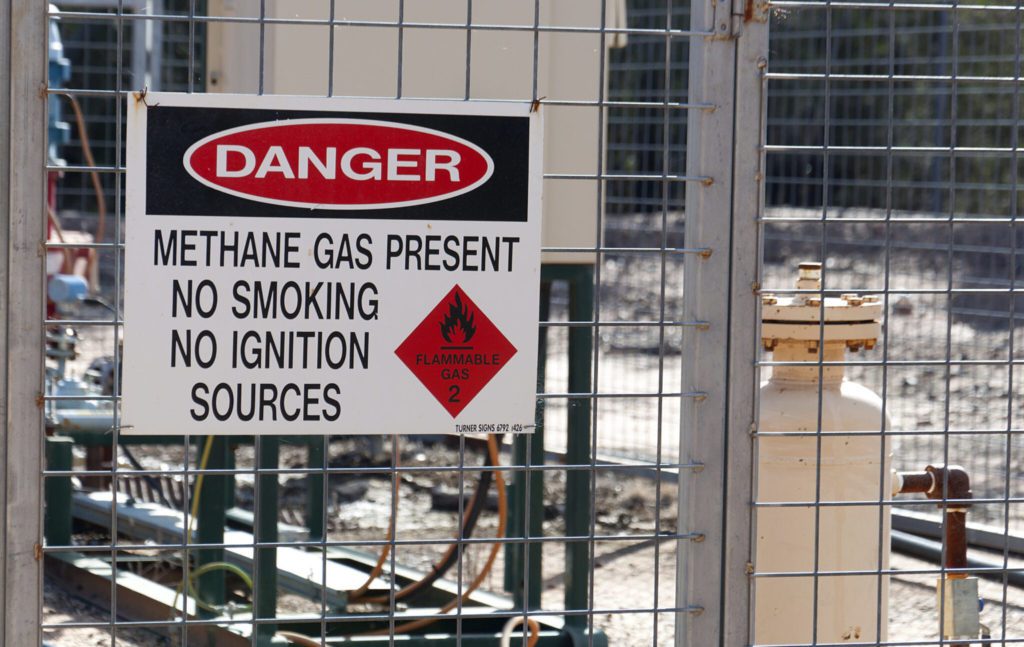


Despite claiming to endorse a carbon tax, ExxonMobil has funneled millions of dollars to lawmakers who oppose the idea.
By Elliott Negin, Independent Media Institute
8 min read
When then-ExxonMobil lobbyist Keith McCoy conceded in a secretly recorded video in May that the oil giant voiced support for a carbon tax only because it assumed it would never happen, ExxonMobil CEO Darren Woods said the company was “shocked by these interviews” and stood by its “commitments to working on finding solutions to climate change.”
Wood’s reaction was reminiscent of Captain Louis Renault feigning surprise to discover gambling at Rick’s Café in the 1942 film “Casablanca.” After quietly pocketing his winnings, Renault justifies closing down the nightclub by exclaiming, “I’m shocked, shocked to find that gambling is going on in here!”
Woods was shocked? Really? Just one look at his company’s financial records would show that despite claiming to endorse a carbon tax—initially in a cynical attempt to derail a cap-and-trade bill that was under consideration in 2009—ExxonMobil has funneled millions of dollars over the last decade to lawmakers who staunchly oppose the idea.
Backing Climate Science Deniers
One tried-and-true way corporations ensure access to Congress is by making campaign contributions. Although there may not be a verifiable quid pro quo, donations guarantee access, and access guarantees influence.
So, given ExxonMobil’s professed support for a carbon tax, one might reasonably assume that the company’s political action committee (PAC) and employees would back lawmakers who sponsor such legislation and, over time, withdraw their funding for senators and representatives who stand in the way.
In fact, the opposite is true.
During the video interview, McCoy—who at the time was ExxonMobil’s senior director of federal relations—compared lobbying Congress with fishing.
“When you have an opportunity to talk to a member of Congress,” he said, “I liken it to fishing, right? You know you have bait, you throw that bait out…. And… [then you start to] reel them in…. They’re a captive audience. They know they need you. And I need them.”
The goal, he explained, is to develop a close relationship with legislative staff. “You want to be able to go to the chief… and say, look, we’ve got this issue, we need Congressman So-and-So to be able to either introduce this bill, we need him to make a floor statement, we need him to send a letter,” he said. “You name it, we’ve asked for everything.”
Not quite everything. ExxonMobil apparently has not asked for a carbon tax, notwithstanding the fact that the company was one of the founding members of the Climate Leadership Council (CLC), a bipartisan, industry-supported group, which was formed in 2017 to promote a carbon tax, and a year later, the company pledged to give $1 million over a two-year period to Americans for Carbon Dividends (AFCD), the council’s lobbying arm. Over the last decade, members of both houses have voted on a handful of carbon tax-related amendments and nonbinding resolutions. In every case, a sizable majority who received donations from ExxonMobil’s PAC and employees rejected the idea. For example:
- In March 2015, the Senate voted 58 to 42 to pass a budget amendment prohibiting a carbon tax. Thirty of the 40 senators who had received ExxonMobil campaign contributions since 2010, including amendment sponsor Roy Blunt (R-MO), voted in favor of the prohibition.
- In June 2016, the House passed a resolution introduced by Steve Scalise (R-LA) stating that a carbon tax “would be detrimental to American families and businesses” by a 237 to 163 margin. Eighty-five percent of the House members who voted for the resolution had received ExxonMobil political donations since 2013. By contrast, only 26 of the representatives who voted against the resolution—16 percent—had received ExxonMobil money.
- In July 2018, the House passed another Scalise-sponsored resolution asserting that “a carbon tax would be detrimental to the United States economy,” this time by a 229 to 180 vote. During the 2018 election cycle, 75 percent of the representatives who gave the resolution a thumbs up received ExxonMobil donations. Only 23 percent of the 180 who voted against it got ExxonMobil funding.
The disparity between ExxonMobil’s PAC donations to supporters of the July 2018 Scalise resolution and its opponents is even more telling, given that PACs—which can contribute as much as $10,000 to a candidate per two-year cycle—more accurately represent a company’s agenda than that of individual employees. The ExxonMobil PAC contributed more than $935,000 to 74 percent of the resolution’s supporters, but only $109,500 to opponents during the 2018 election cycle. Scalise, the resolution’s sponsor, and 37 of his 48 resolution cosponsors received ExxonMobil PAC contributions.
The most recent congressional carbon tax vote took place in the Senate in February during a round of votes on the pandemic relief bill. John Hoeven (R-ND) sponsored an amendment that would have prohibited such a tax. It was rejected on a strict party-line vote: All 50 Republican senators voted for the amendment; all 50 Democratic senators voted no.
ExxonMobil PAC donations to those senators are mostly party-line, too. Twenty-seven of the 50 Republicans collectively have received $233,000 during the 2018 and 2020 election cycles. Over that same time frame, the PAC contributed just $62,000 to 11 of the Democrats.
Snubbing Carbon Tax Proponents
In January 2018, ExxonMobil Vice President of Public and Government Affairs Suzanne McCarron reaffirmed the company’s support for a carbon tax, the Paris climate agreement and other related climate policies in a blog post on the company’s website. ExxonMobil, she maintained, is “committed to being part of the solution.”
Nevertheless, during the 2018 and 2020 election cycles, ExxonMobil employees and its PAC donated nearly $834,000 to 28 of the 30 senators and 90 of the 109 representatives currently in Congress who, according to the Center for American Progress, still reject the scientific consensus that global temperatures are rising and that burning fossil fuels is largely to blame. The company’s PAC funded 16 of the climate science deniers in the Senate and 81 in the House.
Lawmakers sponsoring carbon tax legislation, meanwhile, have enjoyed considerably less support. Over the last two election cycles, climate science deniers in the 117th Congress received six and a half times more from ExxonMobil than carbon tax proponents.
Two carbon tax bills have been introduced in the Senate this session, both by Democrats: one sponsored by Rhode Island Sen. Sheldon Whitehouse, which has nine cosponsors, the other by Illinois Sen. Dick Durbin. Three carbon tax bills have been introduced in the House: one sponsored by Pennsylvania’s Republican Rep. Brian Fitzpatrick with one cosponsor, another by Connecticut’s Democratic Rep. John Larson with two cosponsors, and a third by Florida’s Democratic Rep. Theodore Deutch with 84 cosponsors.
Since 2017, ExxonMobil employees and the company PAC have donated only $127,692 to these carbon tax proponents: $35,486 to eight of the 11 sponsors and cosponsors in the Senate and $92,206 to 33 of the 90 sponsors and cosponsors in the House. The PAC contributed to only three of the senators and 12 of the representatives.
Despite this decidedly lopsided funding pattern, McCoy insisted during the interview that ExxonMobil wants to work with lawmakers on carbon tax legislation. “Put forth a bill and we’ll show you that we’ll support that bill, we’ll help you work on that bill,” he said. But, he added, “Nobody wants to do that because it’s not politically expedient to put forth a tax for people, it just isn’t.”
In fact, a number of lawmakers have “put forth a bill” to establish a carbon tax in successive congressional sessions, but the company has shown no support, and neither McCoy nor ExxonMobil’s other in-house lobbyists have broached the topic with members of Congress since 2018—the same year it announced its $1 million donation to the Climate Leadership Council’s lobbying arm, AFCD—according to ExxonMobil’s quarterly lobbying reports.
Staffers working for Rep. Larson and Sen. Whitehouse, who both have been sponsoring carbon tax legislation for years, recently verified that ExxonMobil has not expressed support for their respective proposals. Larson introduced a bill in 2009, the same year that ExxonMobil announced that it favored the policy, while Whitehouse first sponsored one in 2014 and has reintroduced a version of it in every session since.
Out of frustration, Whitehouse and his fellow bill sponsor, Sen. Brian Schatz of Hawaii, sent a letter to ExxonMobil in August 2016 criticizing the company for its indifference.
“Regarding ExxonMobil’s alleged seven years of support for a carbon fee, we’ve seen no meaningful evidence of that,” the senators wrote. “None of the top executives that make up ExxonMobil’s management team has expressed interest in meeting with any of us to discuss the Whitehouse-Schatz proposal or any carbon fee legislation.”
Five years later, nothing has changed on that front. A Whitehouse spokesperson says his office is not aware of ExxonMobil supporting any carbon pricing legislation, let alone the senator’s.
But McCoy’s revelations did have consequences: The Climate Leadership Council kicked ExxonMobil out of the organization in August; the Union of Concerned Scientists and other public interest groups cited McCoy’s comments in a “friend of the court” brief filed in Minnesota’s climate science deception lawsuit against ExxonMobil; and the House Committee on Oversight and Reform asked McCoy to testify about his company’s campaign to mislead the public “about the dangers of fossil fuels and their role in causing global climate change.”
As for McCoy’s job status, an ExxonMobil spokesperson told E&E News in late September that “McCoy no longer works for the company.”
If McCoy does wind up testifying before Congress, he would serve as the opening act for a hearing that the Oversight Committee plans to hold on October 28 featuring his former boss Darren Woods and top executives from other major oil and gas companies. Finally, under oath, Woods and his colleagues will have to answer questions about their decades-long effort to block government action on climate.
###
Elliott Negin is a senior writer at the Union of Concerned Scientists.
Take action…

Change.org: Nathaniel Scott from East Lyme, Connecticut, wrote in 2019, when he was nine years old: “Arctic animals are dying every day because of more and more oil and gas expansions. We need to help them. The situation for Arctic species is already very bleak but will be even worse if more and more journeys to the north are happening, where the habitat for these animals is being disturbed. Also, more fossil fuel means more pollution and climate change, which means a smaller habitat for these creatures to call home. But together we can stop oil expansion in the Arctic. With your help, oil and gas expansion will hopefully be stopped in the far north so these beautiful creatures can live a good wholesome life in the wild. If the government and major oil companies take these issues [seriously] then hopefully more and more people will agree and try to save the Arctic. Killer whales, walruses, polar bears—the list goes on and on of species [that] will become more and more endangered unless we do something about it.”
Urge ExxonMobil, Shell and Gazprom to stop plans to expand oil and gas exploration in the Arctic.
Cause for concern…

“We have to make sure… (the COVID-19 stimulus measures) [are] strengthening biodiversity and not adding to the problem,” said David Cooper, deputy executive secretary of the United Nations Convention on Biological Diversity. “Globally, if you look around, the stimulus packages are making it worse rather than better.”
- United Nations warns that nations aren’t spending enough on species protection as new talks begin (David Stanway, Reuters)
- Senator Kyrsten Sinema (D-Ariz.) wants to cut $100 billion in proposed climate funds, sources say (Coral Davenport, New York Times)
- In secret tapes, palm oil execs disclose corruption, brutality (Desmond Butler, Washington Post)
- As the climate bakes, Turkey faces a future without water (Paul Hockenos, Yale Environment 360)
Round of applause…

“Replacing dangerous HFCs [hydrofluorocarbons] in key products will bring us a smooth and rapid transition to climate-friendlier air conditioners, refrigerators, aerosols, insulation, and other products Americans use every day, saving money and energy for consumers, creating new jobs, and protecting our climate and our health,” said Christina Theodoridi, a climate and clean energy policy advocate at the Natural Resources Defense Council, an environmental nonprofit, following the Environmental Protection Agency’s decision to grant 10 petitions to cut the use of HFCs, which are a potent greenhouse gas.
- EPA grants petitions to stem climate pollutants in future rules (Jennifer Hijazi, Bloomberg Law)
- DOE announces goal of 5 million homes powered by community solar (Zack Budryk, The Hill)
- Top United Nations panel votes to recognize human right to a clean environment (Katie Surma, Inside Climate News)
- End to deforestation sought at COP26 climate summit (Michael Taylor, Thomson Reuters Foundation)
- 30 percent of global consumers ‘likely’ to eat vegan eggs instead of conventional ones (Jemima Webber, Plant Based News)
ICYMI…

“[C]limate change isn’t the only issue exacerbated by methane: Public health also suffers, as methane emissions increase ground-level ozone, commonly known as smog, a cause of respiratory disease like asthma, as well as cardiovascular disease. In the COVID era, anything that negatively impacts lung function makes people more susceptible to the effects of coronavirus infection. Natural gas development also emits pollutants, including ultrafine particulate matter that can damage the heart, liver, kidneys and central nervous system. Fracking, the process of extracting natural gas, also uses more than 50 toxic chemicals that are known or suspected carcinogens. These health effects impact ‘frontline communities,’ communities of color and low-income, whose neighborhoods usually lack basic infrastructure to support them and protect them from pollution, many of them near oil and gas facilities.”
—EFL editor Reynard Loki, “Methane: The Forgotten Climate Change Driver That’s Poisoning Frontline Communities,” Independent Media Institute, January 5, 2021.
Parting thought…

“A bird comes to the window. It’s a mistake
to think of them
as birds, they are so often
messengers. That is why, once they
plummet to the sill, they sit
so perfectly still, to mock
patience, lifting their heads to sing
poor lady, poor lady, their three-note
warning, later flying
like a dark cloud from the sill to the olive grove.”
—Louise Glück, “Penelope’s Stubbornness,” from Meadowlands (1996)
Earth | Food | Life (EFL) explores the critical and often interconnected issues facing the climate/environment, food/agriculture and nature/animal rights, and champions action; specifically, how responsible citizens, voters and consumers can help put society on an ethical path of sustainability that respects the rights of all species who call this planet home. EFL emphasizes the idea that everything is connected, so every decision matters.
Click here to support the work of EFL and the Independent Media Institute.
Questions, comments, suggestions, submissions? Contact EFL editor Reynard Loki at [email protected]. Follow EFL on Twitter @EarthFoodLife.